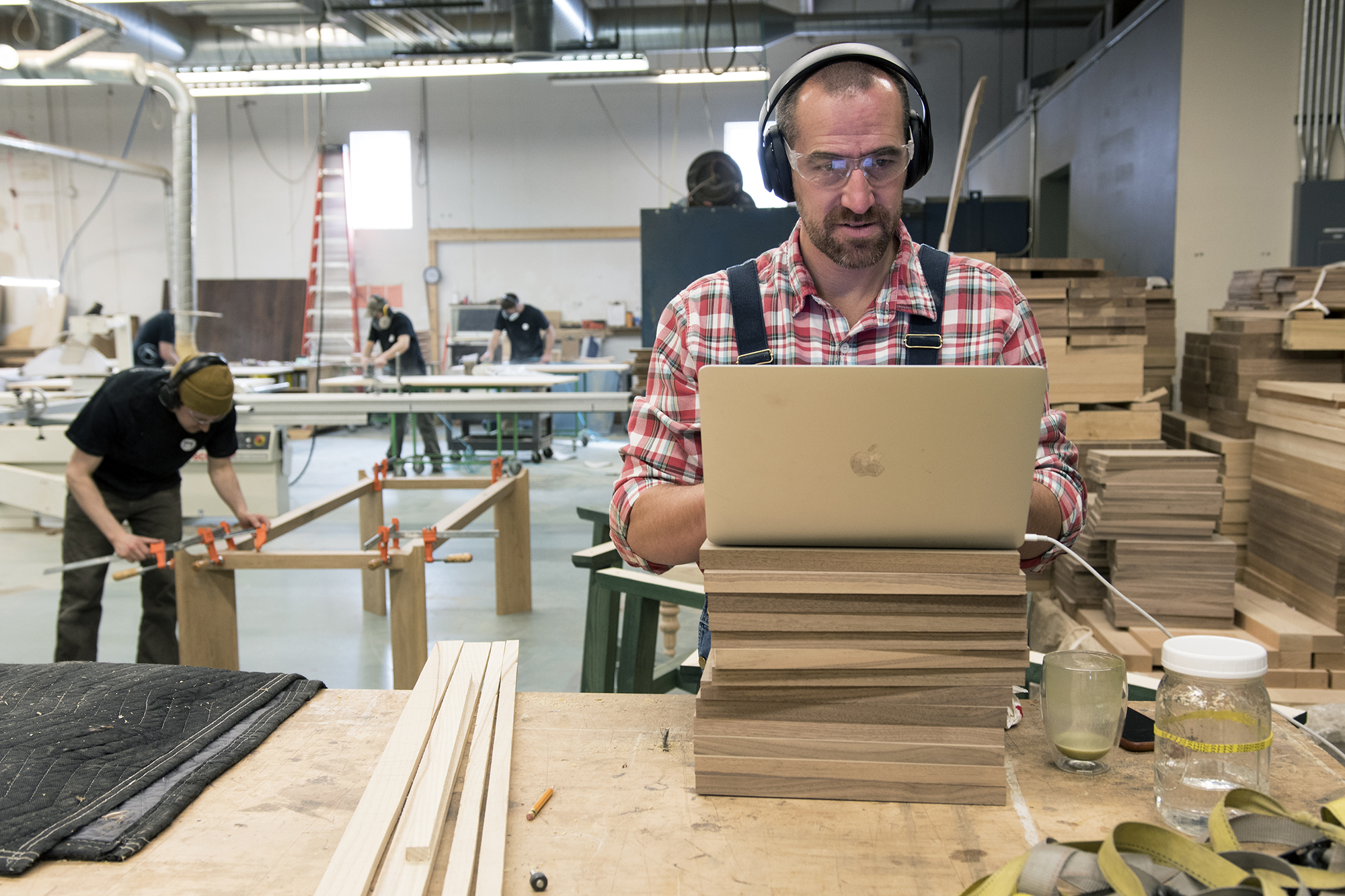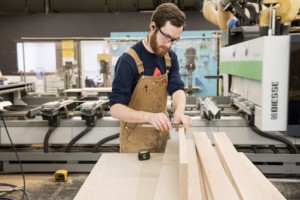Vermont Farm Table Grows Business, Connection to Vermont’s Working Landscape
March 30, 2018

Owner, Dustin Glasscoe Named 2017 Vermont Woodworker of the Year
Dustin Glasscoe, owner of Vermont Farm Table, is quick to point to his team of woodworkers in Bristol when asked about being named 2018’s Vermont Woodworker of the Year. “I’m a business owner,” he clarifies, “not a woodworker.” While he may not be crafting the tables, stools and benches that earned him recognition from the Vermont Wood Works Council, he is unquestionably the visionary at the helm of his small and dedicated team.
Dustin grew up working in his dad’s woodshop, surrounded by sawdust, buzzing tools and the smell of fresh wood. But his passion for building dining tables grew from his love of good food and bringing people together to share a meal. After spending a few years in the culinary world, Dustin moved to Vermont with the vision of starting and growing a business. Vermont’s entrepreneurial climate and myriad of artisan food producers– not to mention world-class skiing and hiking– drew him to the Green Mountain State in 2009. “I wanted to build something I could be proud of in 30 years,” said Glasscoe.
If the first ten years are any indication, Glasscoe is well on his way to achieving that vision. Sales doubled last year, and are projected to double again in 2018. His current staff of 18 is rapidly moving toward 30 plus. The simple, functional design of Vermont Farm Table furniture is in demand by consumers, architects, and interior designers around the country, with high profile projects like the Trapp Family Lodge Bierhall now part of their portfolio. It’s almost dizzying to listen to Dustin talk about his ideas for the future of the business, which range from a community woodshop, to partnerships with Vermont food producers, to a destination experience where visitors can take part in a timber harvest and make their own table to bring home.
The Vermont Connection
From start to finish, Vermont Farm Table’s manufacturing process is local. Though wood is purchased from a variety of locations, the tables are locally made with solid wood in the company’s woodshop in Bristol, Vermont. High quality machinery and technology are balanced by a craftsman’s eye, ensuring that wood grain patterns and aesthetics work for every piece. The finishing process involves multiple coats of an oil and wax finish applied by hand over the course of several days. Connecting back to the community, wood scraps from the shop– enough to fill thirty 55-gallon drums each week– are sent to a local woodbank, which collects and distributes firewood for Vermonters in need.
Glasscoe recently received a grant from the Vermont Working Lands Initiative to help promote the use of local wood, something he is hoping to grow in his own business. Demand for specific wood species often comes down to color choice. Customers who want the darker look of cherry or walnut, or the character of reclaimed wood, are unlikely to choose a Vermont maple based on origin alone. But Glasscoe is working to better market local wood in order to increase demand. Among other initiatives, he is creating a new display in his Burlington retail shop that showcases local wood species, has begun tracking all local wood purchases and the carbon offset that results from shorter transportation routes, and has partnered with a local logger, Joel Currier, to tell a story that connects the consumer to Vermont’s working landscape. Glasscoe also points to portfolio projects that use Vermont wood, such as the Trapp Family Lodge Bierhall, in pitches to large, commercial projects as his opportunity to impact demand lies in projects where he can influence design.

Noah Burke prepares wood to be loaded onto a Computer Numeric Controlled Router Operator at Vermont Farm Table. The router is a computer-controlledcutting machine connected to a hand-held router used for cutting various hard materials, including wood.
A Great Responsibility
Dustin talks about the wood he uses to build furniture with reverence. “I feel a great responsibility to do something meaningful with each piece of wood that comes through our door. We are taking a tree that has been growing for 100 to 150 years and making something important– a place for families to gather over a meal. People are always amazed to see that we actually make something tangible. Our business is not about tech or social, it’s about real people building beautiful and functional furniture designed to last for generations.”
Vermont Forest Industry Network
Vermont’s forest products industry generates an annual economic output of $1.5 billion and supports 10,000 jobs in forestry, logging, processing, specialty woodworking, construction, and wood heating. The new Forest Industry Network creates the space for industry professionals from across the entire supply chain, along with trade association partners, to build strong relationships and collaboration in order to promote new and existing markets for Vermont wood products, from high quality furniture to construction material to thermal biomass products such as chips and pellets. Learn more or join at www.vsjf.org.
Top: Dustin Glasscoe, owner of Vermont Farm Table, works on his laptop at the company’s woodworking shop in Bristol.




